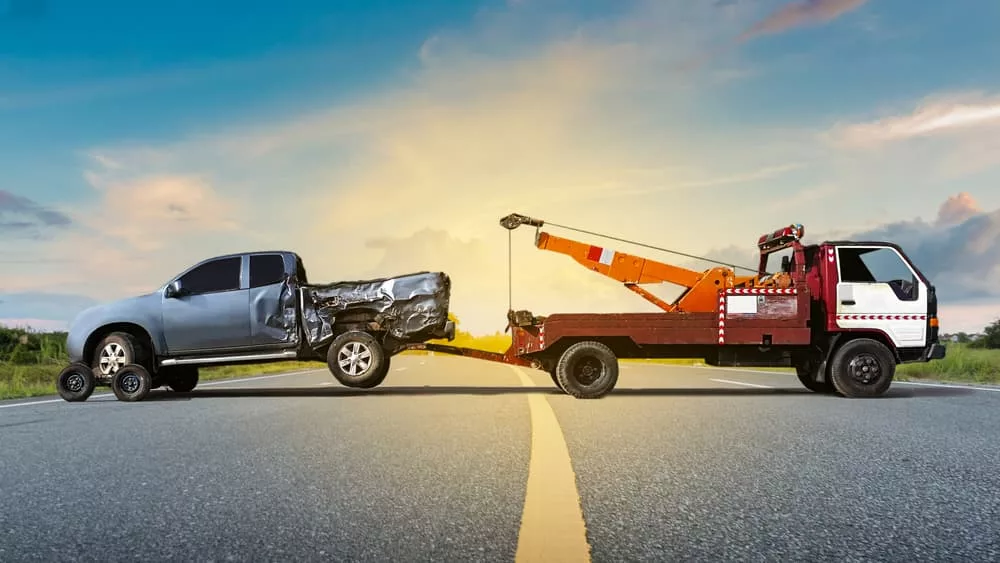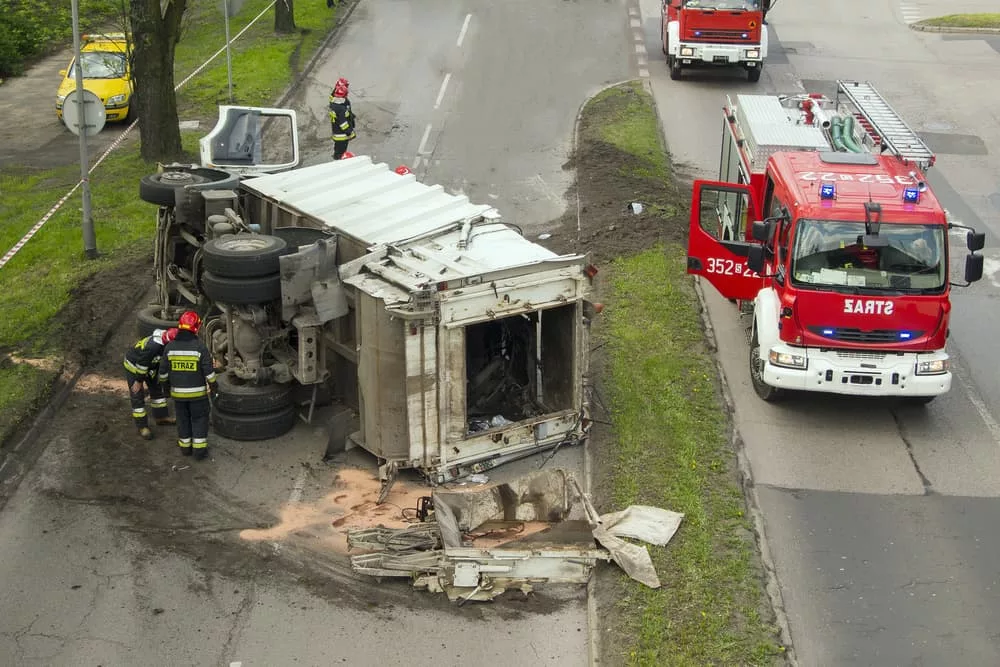Approximately 388,000 truck accidents occur each year in the United States, resulting in roughly 110,000 injuries and nearly 6,000 deaths. Because of their size and weight, trucks can cause devastating injuries when they collide with passenger cars. Too often, a truck driver or trucking company’s negligence causes these accidents. Distracted driving, inadequate training, negligent hiring practices, and poorly maintained commercial vehicles can all contribute to truck accidents.
The Federal Motor Carrier Safety Administration (FMCSA) governs trucking companies and has established rules and regulations to prevent truck accidents.
When a truck accident injures someone, they need to retain a truck accident lawyer to recover maximum compensation for their damages. An experienced truck accident will quickly investigate to determine the cause of the crash and identify the at-fault party, and that usually involves reviewing their safety records. A FMCSA violation can help prove a truck driver or trucking company’s fault for the crash, and greatly improve the compensation a truck accident victim can recover.
What Is the Federal Motor Carrier Safety Administration?
The U.S. Department of Transportation established FMCSA under the Motor Carrier Safety Improvement Act of 1999 to establish safety guidelines among commercial motor vehicle (CMV) carriers and drivers to prevent truck accidents.
FMCSA partners with federal, state, and local enforcement agencies; the trucking industry; labor safety interest groups; and others to:
- Enforce safety regulations
- Hold high-risk carriers and truck drivers accountable for their actions
- Improve safety information systems and technologies
- Strengthen commercial truck equipment and operating standards
- Raise awareness of commercial vehicle safety.
FMCSA enforces many trucking industry rules and regulations.
Who Do FMCSA Rules and Regulations Cover?
FMCSA rules and regulations govern trucking industry carriers if they operate any of the following commercial motor vehicles in interstate commerce:
- Vehicles with a gross vehicle weight rating or gross combination weight rating (whichever is greater) of 10,001 pounds or more (GVWR, GCWR, G.V.W. or G.C.W.)
- Vehicles designed or used to transport between nine and 15 passengers (including the driver) for direct or indirect compensation
- Vehicles designed or used to transport 15 or more passengers, including the driver, and not used for compensation
- Vehicles of any size used to transport materials categorized as hazardous by the Hazardous Materials Transportation Act and that require placards under the Hazardous Materials Regulations (49 C.F.R. Parts 100-177)
- All Intrastate Hazardous Materials (Hazardous Materials Regulations) carriers
Carriers must ensure that their drivers know and comply with the FMCSRs and H.M.R.s listed in Title 49 of the U.S. Code of Federal Regulations. A driver who doesn’t comply will hurt the carrier’s safety record.
Overview of FMCSA Rules and Regulations

Truck drivers and trucking companies must comply with FMCSA rules and regulations to ensure the safety of others. In the case of a truck accident, a violation of an FMCSA regulation can help prove fault on the part of a truck driver or trucking company.
Here is an overview of some FMCSA rules and regulations for commercial motor vehicle carriers:
Hours of Service Regulations
FMCSA established hours of service (HOS) regulations to prevent driver fatigue and ensure that drivers have adequate rest before operating a CMV. These regulations limit the hours a driver can work and the number of hours they can drive in a day.
The current HOS regulations are:
- Drivers cannot drive more than 11 hours in a day
- Drivers cannot be on duty for more than 14 hours in a day
- Drivers must take a 30-minute break after eight hours of driving
- Drivers must take a 10-hour break before starting a new workday
- Drivers cannot drive more than 60 hours in a seven-day period or 70 hours in an eight-day period
Drug and Alcohol Testing Regulations
The FMCSA requires drug and alcohol testing for all CMV drivers to ensure that they do not operate a vehicle while impaired, including:
- Pre-employment testing
- Random testing
- Post-accident testing
- Reasonable suspicion testing
Vehicle Maintenance Requirements
FMCSA also established regulations to keep CMVs properly maintained and safe to operate. These regulations require that drivers conduct pre-trip inspections and that all CMVs undergo regular inspections and maintenance.
Training Requirements for Truck Drivers
FMCSA establishes training requirements for truck drivers to ensure that drivers obtain proper qualifications and training to operate commercial motor vehicles:
Driver Qualification Requirements
Before a driver can operate a CMV, they must:
- Be at least 21 years old (18 years old for intrastate operations)
- Possess a valid commercial driver’s license (CDL)
- Pass a medical examination to ensure they can physically operate a CMV
- Pass a background check to ensure they have a safe driving record and do not have any disqualifying criminal offenses
Training for Hazardous Materials Transportation
Drivers who transport hazardous materials (HM) must receive specialized training to ensure they can safely handle and transport these materials.
FMCSA requires that all HM drivers receive:
- General awareness/familiarization training with HM regulations
- Function-specific training (loading, unloading, etc.)
- Safety training
- Security awareness training
In addition to this initial training, HM drivers must also receive recurrent training every three years to remain up-to-date on the latest regulations and safety procedures.
Accident Reporting and Investigation Procedures
Truck drivers and carriers must follow proper reporting and investigation procedures to comply with FMCSA regulations and promote safety after an accident with a commercial motor vehicle.
Reporting Requirements for Accidents
All carriers involved in an FMCSA-reportable crash in the past year must retain an Accident Register or report. A reportable crash includes one where a vehicle was towed from the scene, or an injury or fatality occurred.
The documents required by §390.15 (b) (2) include all information about a particular accident generated by a motor carrier or driver to fulfill its accident reporting obligations to state or other governmental entities or that motor carrier’s insurer.
Investigation Procedures for Accidents
Following an accident, proper investigation procedures should be followed to determine the cause of the accident and prevent future incidents.
The Motor Carrier Safety Planner recommends that authorities:
- Secure the accident scene to protect the safety of those involved and passing motorists.
- Gather information and evidence, including photographs, witness statements, and vehicle and driver information.
- Conduct a thorough investigation to determine the cause of the accident.
- Take corrective action to prevent similar accidents.
When investigating, FMCSA will consider all factors that may have contributed to the accident, including driver behavior, vehicle maintenance, and environmental conditions. FMCSA should investigate in a timely and thorough manner to gather all necessary information and take appropriate action.
Enforcement of FMCSA Rules and Regulations
Compliance with FMCSA rules and regulations can maintain truck safety.
FMCSA has established enforcement mechanisms to ensure that motor carriers and drivers adhere to these regulations.
Penalties for Non-Compliance
Carriers that fail to comply with FMCSA regulations may face penalties. Penalties for non-compliance can range from fines to suspension or revocation of operating authority. FMCSA may also place a carrier out of service for a history of non-compliance.
FMCSA bases its penalty schedule on the severity of the violation and the carrier’s safety history. For example, a carrier with a history of non-compliance may receive higher penalties than a carrier with a clean safety record.
Inspection Procedures and Criteria
FMCSA conducts inspections to ensure that carriers and drivers comply with its regulations.
FMCSA’s inspection procedures and criteria determine compliance, including:
- Driver and vehicle inspections
- Compliance reviews
- Safety audits
- On-site investigations
During an inspection, FMCSA may review a carrier’s safety management practices, driver qualifications, hours of service, and vehicle maintenance records. If FMCSA finds a carrier noncompliant, it may issue a notice of violation and require corrective action.
To avoid penalties and ensure compliance with FMCSA regulations, all carriers and drivers must maintain accurate records, conduct regular safety training, and stay up to date on regulatory changes.
How Can a Truck Accident Lawyer Help Me?
If a truck accident injured you an experienced attorney can guide you, you may not know the exact cause of the crash. Understanding the circumstances that contributed to your accident can greatly improve your chances of recovering compensation for the losses you suffered.
An experienced lawyer can investigate your case and:
- Secure evidence from the trucking company, such as inspection reports or trucking logs
- Identify the accident cause and all liable parties
- Hire accident reconstruction, medical, engineering, and financial experts to provide testimony
- Determine the extent and value of your damages
- Negotiate a fair settlement with insurance companies
- File your case in civil court within Florida’s statute of limitations
- Represent you in court and advocate for you should your case require a lawsuit
Contact a Truck Accident Lawyer Today
Truck accidents can result in serious, catastrophic injuries and staggering bills for medical treatment. A truck accident lawyer provides much-needed peace of mind that a professional will handle all the legal aspects of your case and work to get you the full compensation you deserve.
You can trust a truck accident lawyer to handle your truck accident claim professionally and thoroughly so you can focus on your own recovery. Don’t delay. Contact a personal injury attorney in Miami today for your free consultation and case evaluation.





